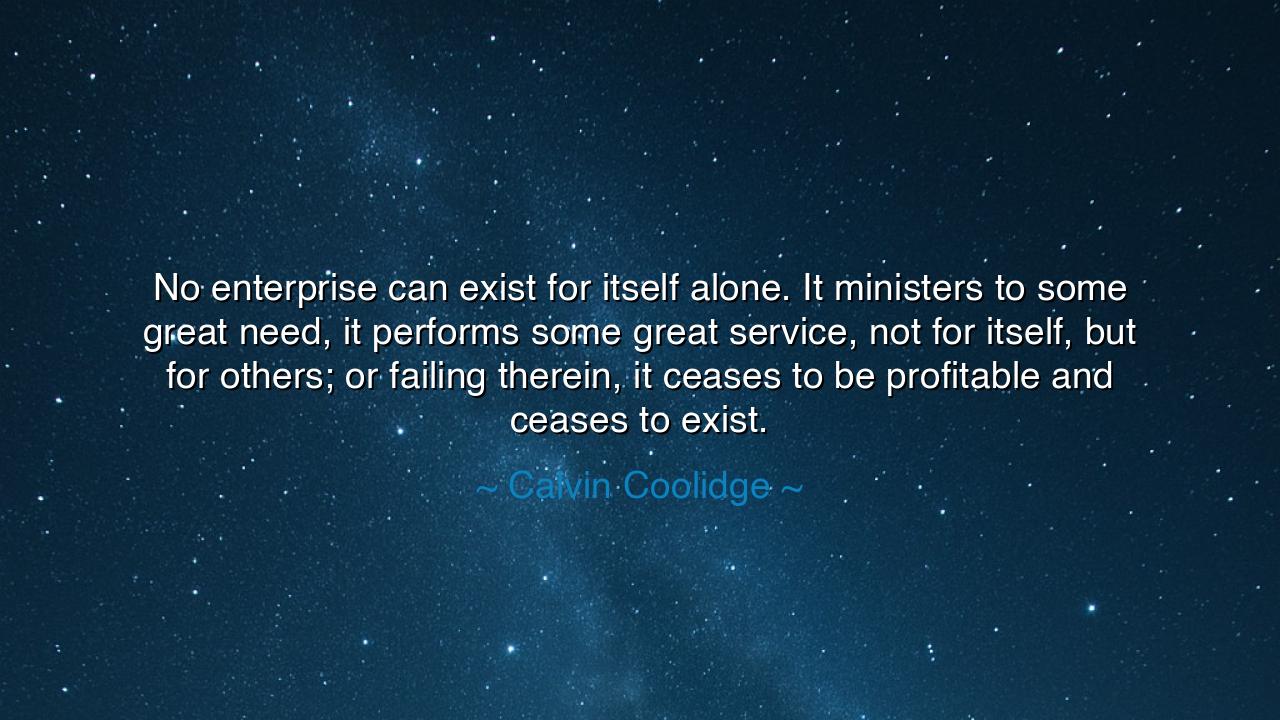
No enterprise can exist for itself alone. It ministers to some
No enterprise can exist for itself alone. It ministers to some great need, it performs some great service, not for itself, but for others; or failing therein, it ceases to be profitable and ceases to exist.






The words of Calvin Coolidge — “No enterprise can exist for itself alone. It ministers to some great need, it performs some great service, not for itself, but for others; or failing therein, it ceases to be profitable and ceases to exist.” — speak with the solemn wisdom of a man who understood the moral rhythm that binds commerce and conscience. In an age when industry was rising like a new titan, Coolidge looked upon its growing power and declared a truth as ancient as civilization itself: that no creation, no enterprise, no work of human hands can endure if it serves only itself. For every endeavor that forgets its duty to others carries within it the seed of its own destruction.
At its heart, this quote is not about economics alone — it is about purpose. Coolidge, the thirtieth president of the United States, governed during a time of prosperity, yet he knew that wealth without service becomes rot. His words remind us that every structure of human labor — whether a company, a government, or an individual life — stands or falls by how well it serves the greater good. The baker who feeds his neighbors, the merchant who trades with honesty, the craftsman who works for beauty and use — these are not merely earning a living; they are participating in the harmony of creation. But when greed eclipses service, when self-interest becomes the only god, the soul of the enterprise withers, and its body soon follows.
We have seen this truth unfold across the ages. Consider the story of the Roman Empire, whose vast might once seemed eternal. Rome began with a vision of shared order and duty — to bring roads, law, and peace to a fractured world. But as centuries passed, its heart turned inward. Its rulers, once guardians of the republic, became servants of excess; its armies, once defenders of civilization, became instruments of conquest for wealth’s sake. The empire no longer existed for others, only for itself — and so it fell, not by the hands of enemies alone, but by the erosion of its own moral foundation. As Coolidge would later warn, no power, no enterprise, no empire can survive long without service.
Coolidge’s insight also mirrors the eternal law of nature itself. The river does not flow for its own sake — it nourishes the valley. The sun does not shine for its own glory — it gives life to all beneath it. Even the tree, silent and still, gives shade, fruit, and oxygen to the world. When man builds in harmony with this divine order — when his enterprises mirror the giving spirit of nature — prosperity follows naturally. But when he defies it, hoarding and consuming without giving, he violates the very principle that sustains existence. In this way, service is not a moral luxury; it is a law of survival.
There is also a lesson here for our own age — an age filled with companies that reach across the globe and individuals who measure success by possession rather than purpose. The modern world dazzles with innovation, yet Coolidge’s words still burn with relevance. For what is a business that pollutes the earth to enrich itself, or a corporation that exploits labor to feed shareholders? It may prosper for a moment, but in the long march of time, it too will cease to be profitable and cease to exist. The universe has its quiet justice: what serves none but itself eventually collapses beneath the weight of its own vanity.
But Coolidge’s teaching is not one of condemnation — it is one of awakening. He calls every person, every enterprise, to remember that greatness is found not in taking, but in giving. To minister to a need, to perform a service — these are the true pillars of enduring success. The merchant who builds his fortune by improving the lives of others, the artist who uplifts the spirit of his audience, the teacher who shapes the mind of a child — all these embody Coolidge’s wisdom. For the measure of a life, like that of an enterprise, is not in how much it gathers, but in how much it gives.
The lesson, then, is both simple and eternal: live and work for others as much as for yourself. Let every effort you make — in business, in art, in service, in life — carry within it some spark of contribution. Ask not only, “What will I gain?” but also, “Whom will this help?” Build not for greed, but for goodness; strive not only for profit, but for purpose. For when your labor uplifts others, it also uplifts you; when your enterprise serves life, life in turn sustains your enterprise.
So, O seeker of wisdom, remember Coolidge’s truth: no creation thrives in isolation. The heart that beats only for itself soon stops beating. But the heart that beats for others becomes immortal — its rhythm carried forward in every life it touches. Let your work, your art, your enterprise, and your days be instruments of service; for in service lies both the secret of prosperity and the soul of enduring greatness.






AAdministratorAdministrator
Welcome, honored guests. Please leave a comment, we will respond soon